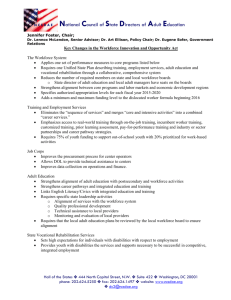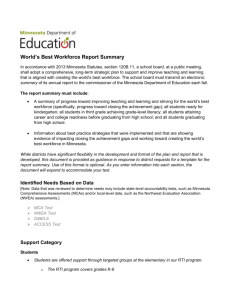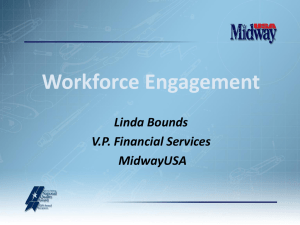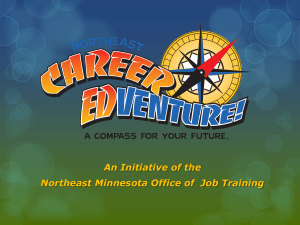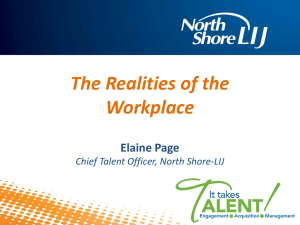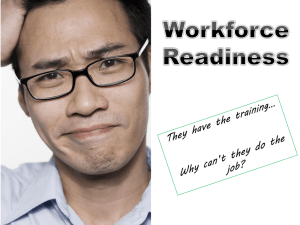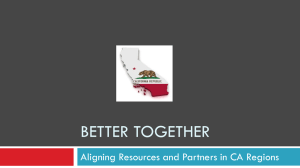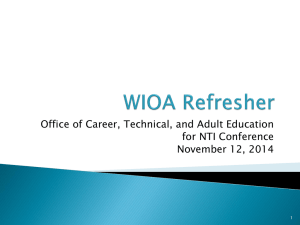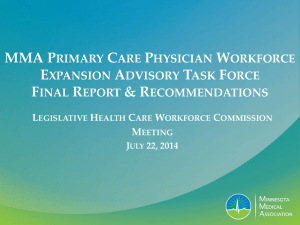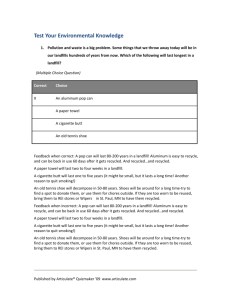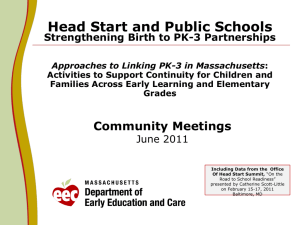Pathways to College and Career Readiness
advertisement
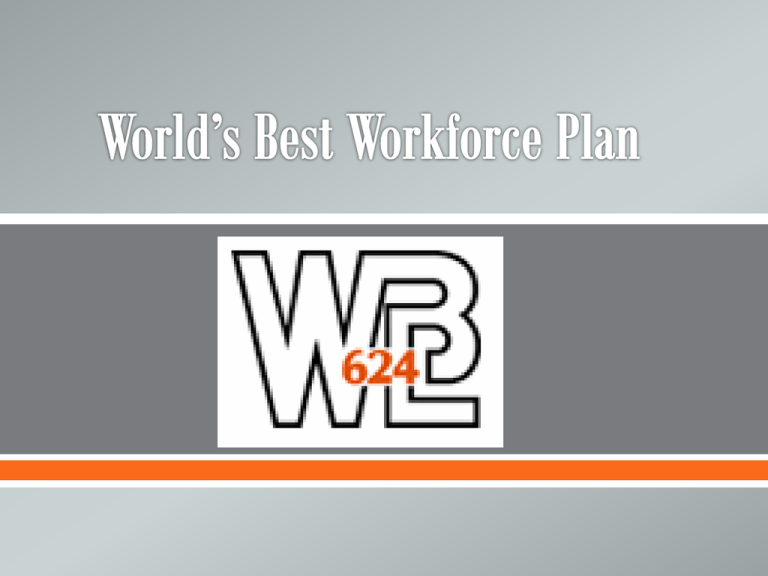
World’s Best Workforce Legislative Actions/Intent MDE Requirements 2014-2015 Articulate alignment of WBWF Plan to WBLAS Strategic Plan • Define Benchmarks on the Pathway to College and Career Readiness • Define work to close identified achievement gaps • Align Curriculum to Standards • Articulate Professional Development Plan • Articulate Principal Evaluation Plan • Articulate Educator Evaluation Plan For Minnesota to be competitive, we must have students who are college and career ready, students who are poised to lead the state’s workforce. This is important for a number of reasons: • Our population is aging. • Seventy percent (70%) of jobs will require more than a high school diploma by 2018. • We don’t have qualified candidates to fill many good-paying jobs. • The fastest growing segment of our future workforce is students of color, and they currently have the state’s lowest graduation rate. • Minnesota has one of the worst black-white achievement gaps in the country. (Minnesota Department of Education) School boards in each district across the state must: • Establish an Advisory Committee that includes members that reflect the diversity of the district and its schools, • Provide a public hearing of the district’s Worlds Best Workforce Plan. District leaders will: • Post an annual report on their progress, • Articulate an implementation plan, • Submit a summary report to the Minnesota Department of Education. (Minnesota Department of Education) Developing our Plan 6 Cabinet Teaching and Learning/Equity Team Principals Teacher Leaders September Study Session October Public Presentation of Recommendations to Board Community Curriculum Advisory Committee Pathways to College and Career Readiness No Child Left Behind Requirements Federal Reporting Our New Focus under World’s Best Workforce Comparing student groups to each other to communicate the achievement gap Comparing each student to college and career readiness standards Change in MCA proficiency since new standards / tests. Comparison of subgroups to all students in the district. Math (2011-14) Reading (2013–14) All Students +5 % point +1 % point White +5 % point +1 % point Asian +6 % point No Change Hispanic +13 % point +3 % point African American +4 % point +3 % point FRL + 8 % point No Change Special Ed + 3% point + 4% point EL - 2 % point - 9 % point World’s Best Workforce Benchmarks High School Ready Middle School Ready Ready for Kindergarten Reading at grade-level by Third Grade Graduating from High School Ready for College and Career 70 % of the White Bear class of 2014 took the ACT. All students in the class of 2016 will take the ACT this spring. 22.9 21 23.4 SCORE # of Students SCORE # of Students 29-36 63 (16.9%) 29-36 91 (24.3%) 24-28 137 (36.7%) 24-28 99 (26.5%) 16-23 163 (43.7%) 16-23 159 (42.6%) 16-lower 10 16-lower 24 MATH (2.7%) READING (6.4%) SCORE # of Students SCORE # of Students 29-36 374 29-36 455 (9.5%) 24-28 1085 (22.6%) 24-28 919 (19.1%) 16-23 3064 (63.8%) 16-23 2897 (60.3%) 16-lower 277 16-lower 531 MATH (7.8%) (5.8%) READING (11.1%) Feedback Loops Inputs Continuous Improvement On-going Feedback Loops Outcomes Educator Parent Core Teaching and Learning Student Content Knowledge Presence/ Engagement College and Career Readiness Academic Skills Life Skills Academic Skills: Content Knowledge: Examples: Ensuring Proficiency and “on track for and Career at key benchmarks” • Ready for Kindergarten • Reading at Grade Level by Third Grade • Ready for Middle School • Ready for High School • Graduating from High School Ready for College and Career • • • • • • • • Organization Time Management Prioritization Concentration Motivation Note Taking Research Skills Technology Skills Life Skills: Presence/Engagement: Examples: Examples: Collaboration Critical Thinking Creativity Communication Self Regulation of Learning Attendance Time in Class Service learningParticipation in After School Activities Operations Programs/Partner Core Teaching and Learning (World’s Best Workforce Requirements) Alignment for Acceleration of our Strategic Work • Strategic Plan Alignment • 1.1 Student Proficiency • 1.2 Post Secondary Plan Core T&L • 2.2 World Language 6-12 (goal) • 2.4 Service Learning • 3.9 Technology Access • 4.11 Classroom Technology • Goal 5D Program Review of Preschool and Early Childhood Programs • Strategic Initiatives Status • Multi-tiered System of Supports (MTSS) Part of ongoing work • Gifted and Talented Tiered system of supports Part of ongoing work • Principal Evaluation Year 2 of Implementation • Teacher Evaluation Year 1 of Implementation • Elementary Schools Standards-Based report cards Year 1 of Implementation • Equity Plan In design phase • Individual Learning Plans In design phase Alignment for Acceleration of our Strategic Work •Strategic Plan Alignment •1.4 Middle School IB Program •2.1 World Language K-5 •2.2 World Language 6-12 (program) •3.4 Student Population Distribution •3.11 Secondary Facilities Study •4.13 Learning Management System- Schoology •4.15 Access to Instructional Technology •6.1 Anti-Bullying Program •6.3 Multi-Cultural Curriculum •6.4 School Transitions •6.5 Programming- School Climate •Goal 5B Consideration of a School-Within-A-School Gifted and Talented Program •Goal 5C Consideration of a String Orchestra Program •Strategic Initiatives Status •Targeted Services In re-design phase •MTSS Part of ongoing work •PD Plan Part of ongoing work •Equity Plan In design phase •Manufacturing Course Articulation In design phase •Immersion Program In design phase th •9 Grade Academy In design phase Alignment for Acceleration of our Strategic Work Strategic Plan Alignment •3.1 Facilities- Large Group Spaces •3.2 Elementary- Performing Arts Facilities •3.3 Storage Facilities •3.5 Facilities- Manuals for Standardized Procedures •3.6 Facilities- Air Quality •3.8 Facilities- Secure Entrances •3.10 Balanced Elementary Class sizes •4.12 District Website •4.14 Technology Policy •5.1 Partnerships Policy •5.2 Partnerships Needs Assessment •5.3 Partnerships Established to Align with District Vision •5.4 Partnerships Communication Plan •6.1 Bullying Policy •6.2 Increase Diversity of Staff •6.6 Cultural Competency and Equity Plan •Goal 2 On-going Financial Stewardship and Budget Management •Goal 3 Continuation of the District Communications and Marketing Plan •Goal 5A Recognition Program •Strategic Initiatives are all reflected in the strategic plan. World’s Best Workforce Benchmarks High School Ready Middle School Ready Ready for Kindergarten Graduating from High School Ready for College and Career Reading at grade-level by Third Grade Focused on Core Teaching and Learning Get Board approval for 2014-15 o Study Session – 9.22.14 o Board Presentation- 10.13.14 WBWF Plan Submit WBWF Summary to MDE o https://education.state.mn.us/mdeprod/idcplg?IdcService=GET_FI LE&dDocName=057575&RevisionSelectionMethod=latestReleased &Rendition=primary • Report on baseline data • Outline implementation plan
